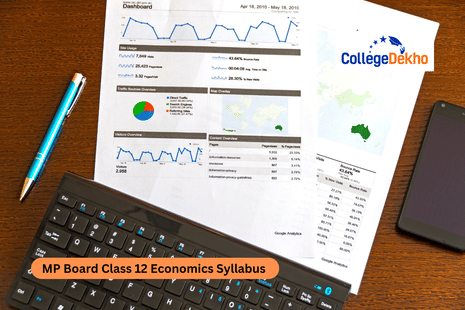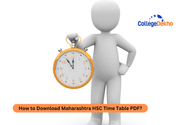

Never Miss an Exam Update
MP Board Class 12 Economics Syllabus 2025-26 is now available on the official website of MPBSE. The syllabus is divided into two parts: Macroeconomics and Microeconomics, which are both to be studied in detail. A total of 11 chapters are included in the curriculum, with five chapters included in Microeconomics and 6 chapters included in Macroeconomics. The question paper will consist of different types of questions according to the MP Board Class 12 Economics Exam Pattern 2026 . To complete your syllabus on time, you need to study from the very beginning of the academic year. Focus on also understanding the practical aspect of the curriculum, including bar graphs, to gain a good score.
If you want to practice the syllabus, then you can do so by downloading the MP Board Class 12 Economics Model Paper 2026. To learn more about the MP Board Class 12 Economics Syllabus 2025-26, scroll down below:
MP Board Class 12 Economics Syllabus 2025-26
A total of 11 chapters is included in the curriculum for Economics. You can check out the detailed information about the topic included in each chapter from the table given below:
Units | Topics |
|---|---|
Microeconomics: An Introduction Chapter | |
Introduction | General economy, central institutions of economy, organization of economic activities, (centrally planned economy, market economy), positive and ideal economics, microeconomics and macroeconomics, book plan. |
Theory of consumer behavior | Utility (cardinal utility analysis, ordinal utility analysis), consumer's budget (budget set and budget line, changes in budget set), consumer's optimal choice, demand (demand curve and law of demand, derivation of demand lines from indifference curves and budget constraints, normal and inferior goods, substitutes and complements, shifts in the demand curve, movements in the direction of the demand curve and shifts in the demand curve), market demand, elasticity of demand (elasticity in the direction of a linear demand curve, factors determining price elasticity of demand for a commodity, elasticity and expenditure. |
Production and Cost | Production function, short run and long run, total product, average product, and marginal product (total product, average product, marginal product), law of diminishing marginal product and law of variable proportions, shapes of total product, marginal product, and average product over time, returns to scale, cost (short run cost, long run cost) |
Theory of the firm in conditions of perfect competition | Perfect competition: Definitional characteristics, attainment, profit maximization, a firm's supply curve (a firm's short-run supply curve, a firm's long-run curve, production closure point, normal profit, and profit unprofitability). |
Market Equilibrium | Equilibrium, maximization, excess supply (market equilibrium: fixed number of firms, market equilibrium: entry and exit), applications (price ceiling, price ceiling) |
Macroeconomics: An Introduction Chapter | |
Introduction | The emergence of macroeconomics, with reference to the present book of macroeconomics |
National Income | Some basic concepts of macroeconomics, circular flow of income, and methods of computation of national income (product or value added method, expenditure method, income method, factor cost, base prices and market prices), some macroeconomic identities, monetary GDP and real taxes, GDP and welfare. |
Money and Banking | Functions of money, demand for and supply of money (demand for money, supply of money), credit creation by the banking system (balance sheet of a hypothetical bank, limits to credit creation and money multiplier, policy instruments to control money supply. |
Determination of Income and Employment | Aggregate demand and its components. Average and marginal propensities for consumption and saving. Output at short-term equilibrium; the mechanism of the investment multiplier. Meanings of voluntary unemployment and full employment. Excess and insufficient demand issues, and solutions like adjustments to government expenditure, taxation, and the money supply. |
Government Budget and the Economy | Government budget – meaning, objectives, and components. Classification of receipts – revenue receipts and capital receipts; Classification of expenditure – revenue expenditure and capital expenditure. Balanced, Surplus, and Deficit Budget – measures of government deficit. |
Payments Balance | Meaning and components of the balance of payments account; Payments balance: Surplus and Deficit Foreign exchange rate definition includes managed floating, flexible rates, and fixed rates. Exchange rate determination in a free market, Benefits and drawbacks of fixed and variable exchange rates. Managed System of floating exchange rates |
Also Check: MP Class 12 Economics Important Questions 2026
How To Download the MP Board Class 12 Economics Syllabus 2025-26?
To download the latest syllabus from the official website of the Madhya Pradesh Board of Secondary Education, you can follow the simple steps given below:
- Step 1: You will first have to visit the official website of the Madhya Pradesh Board of Secondary Education at mpbse.nic.in.
- Step 2: The homepage will open on your screen, where you have to go to the ACADEMICS section.
- Step 3: List of activated links will open on your screen where you have to click on “शैक्षणिक सत्र 2025-26 के लिये कक्षा 9वीं से 12वीं तक समस्त विषयों का पाठ्यक्रम । (कक्षा 9वीं, 10वीं, 11वीं के अंग्रेजी विषय एवं कक्षा 10वीं के सामाजिक विज्ञान विषय को पृथक से अपलोड किया जाएगा।)”
- Step 4: The syllabus PDF for classes 9th to 12th will be displayed on the screen. You can now search for the Economics syllabus easily.
Download MP Board Class 12 Economics Previous Year Question Paper
To understand the syllabus, you can take help from YouTube. Some chapters may require some extra effort, such as national income and demand, and supply. For these chapters, you also need to understand the numerals, which will be included in the board question paper.
FAQs
Students can go through the marking scheme followed by the MP board for Class 12 Economics syllabus. The chapters with the highest marks should be considered important.
Yes, internal choices will be available for students in the MP Board Class 12 Economics exam. Based on their preparation, students can make a choice and solve the questions.
Students can regularly go through the topics in the MP Board Class 12 Economics syllabus and solve the questions related to it. Through regular practice, it will be easy for them to write proper answers and score good marks.
Students should first check out the topics included in the MP Board Class 12 Economics Syllabus. They can divide the syllabus into smaller units and follow the study schedule to complete it in time.
Students can visit the official website of the MP board and get the MP Board Class 12 Economics Syllabus. The syllabus is available in PDF format.















